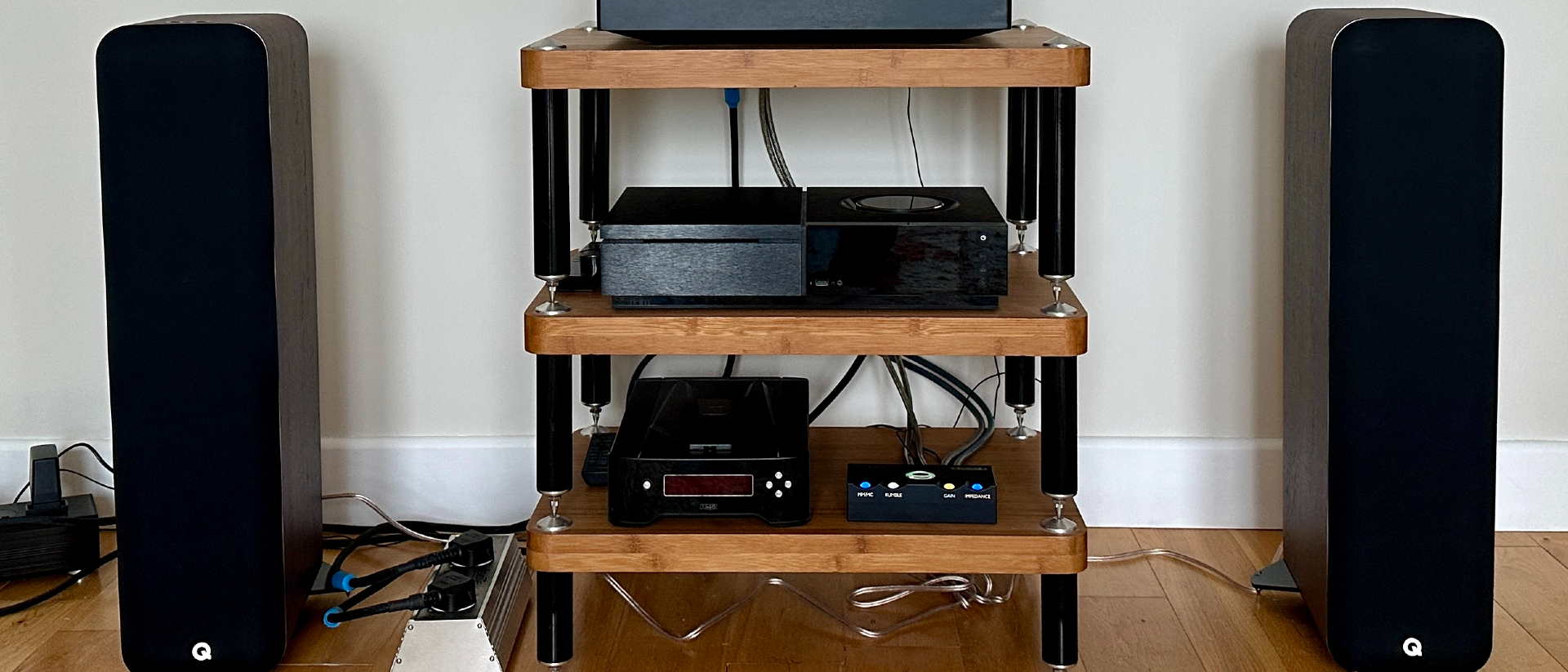TechRadar Verdict
‘Bigger’ is not the same as ‘big’, as the Q Acoustics M40 HD demonstrates – but it also illustrates that ‘bigger’ is quite often ‘better’.
Pros
- +
Big, informative and energetic sound
- +
Usefully compact dimensions
- +
Good standard of build and finish
Cons
- -
No wi-fi connectivity
- -
No control app
- -
Low-frequency response can be provoked
Why you can trust TechRadar
Q Acoustics M40 HD: Two minute review
Understandably emboldened by the success of its wireless-system-in-a-pair-of-speakers M20 HD, Q Acoustics is back with a bigger, floorstanding version. But everything’s relative, of course – and while the M40 HD is a wireless-system-in-a-pair-of-floorstanding-speakers, (so not exactly unlike some of the best wireless speakers we've tested, but not altogether the same either) it’s a lot more compact than you might be expecting. This means it’s ideal for those customers who either don’t have much space to spare, or are unwilling to fill their spare space with great big speakers and h-fi separates.
Specification, with one or two exceptions, is very good – there are wired and wireless connectivity options, and hi-res audio capability through both the digital optical and USB-B inputs. 200 watts of power should be more than enough for most people (and most neighbours). The M40 HD represents the most affordable product so far to feature the new Q Acoustics Continuous Curved Cone (C3) driver. And aptX HD and aptX Adaptive are always welcome where Bluetooth connectivity is concerned. So while some users might hanker after some wi-fi action or a control app, there’s more than enough here to be getting on with.
As far as sound quality is concerned, there is plenty to enjoy here. The M40 HD is a perky, punchy and articulate listen, and as long as you don’t position it too close to a rear surface it’s nicely balanced too. Its sound is consistent no matter which of its inputs you use, and there doesn’t seem to be a type or source of music it doesn’t get along with. So if it’s a big sound from a less-than-big system you’re after, you need to give this Q Acoustics a listen pronto.
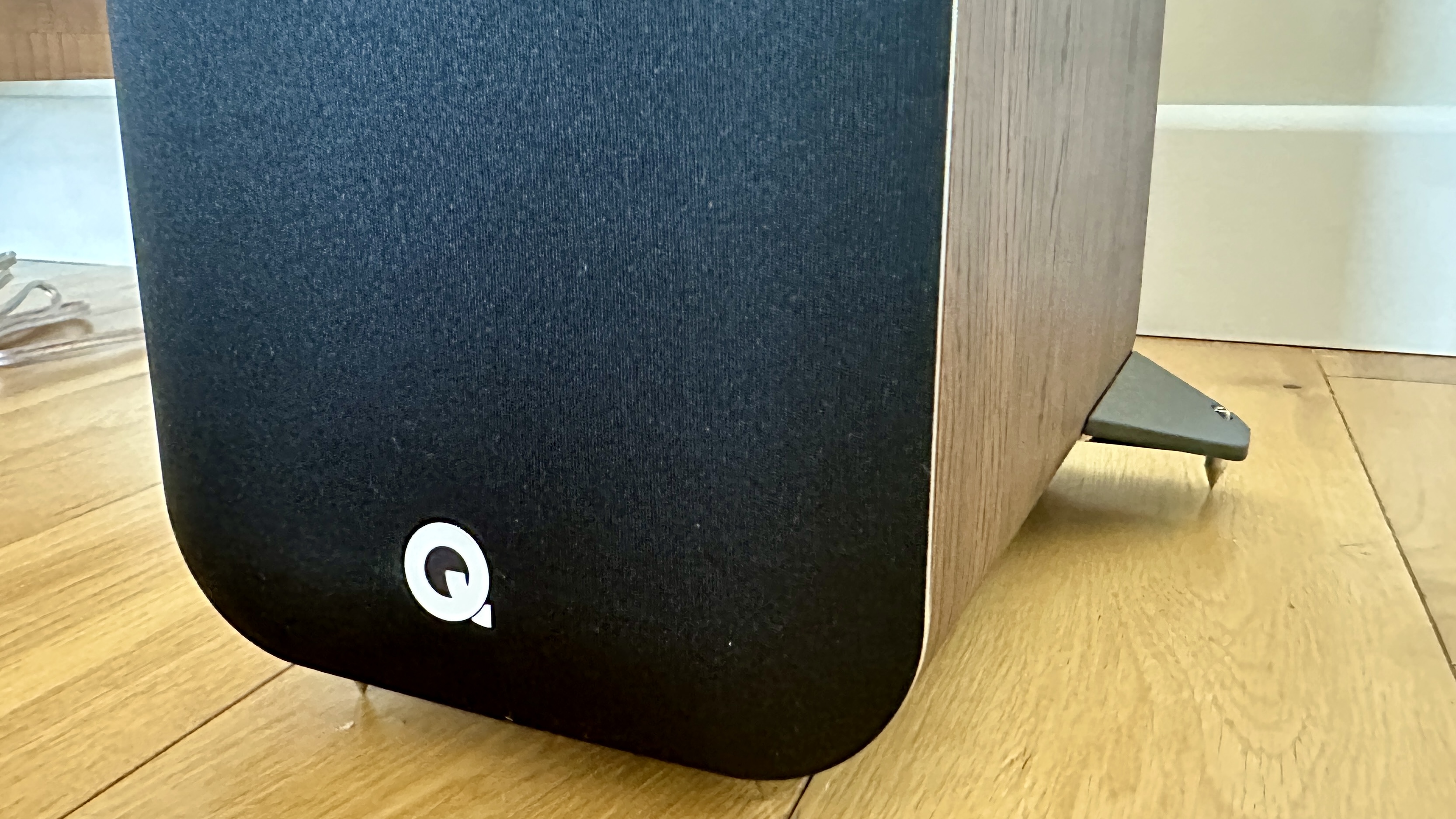
Q Acoustics M40 HD review: Price and release date
- Released February 15, 2024
- $999 / £749 / AU$1,999
The Q Acoustics M40 HD wireless music streaming system is on sale now, and in the United Kingdom it’s priced at £749. In the United States you should expect to pay $999, while in Australia the going rate is AU$1999.
That Q Acoustics knows exactly what it’s doing where products like this are concerned isn’t really up for question. But then neither is the fact that the M40 HD faces well-regarded competition – the likes of KEF, Klipsch and Triangle (to name but three) have fairly similar systems with which to tempt you. Q Acoustics, though, has a fairly obvious point of difference…
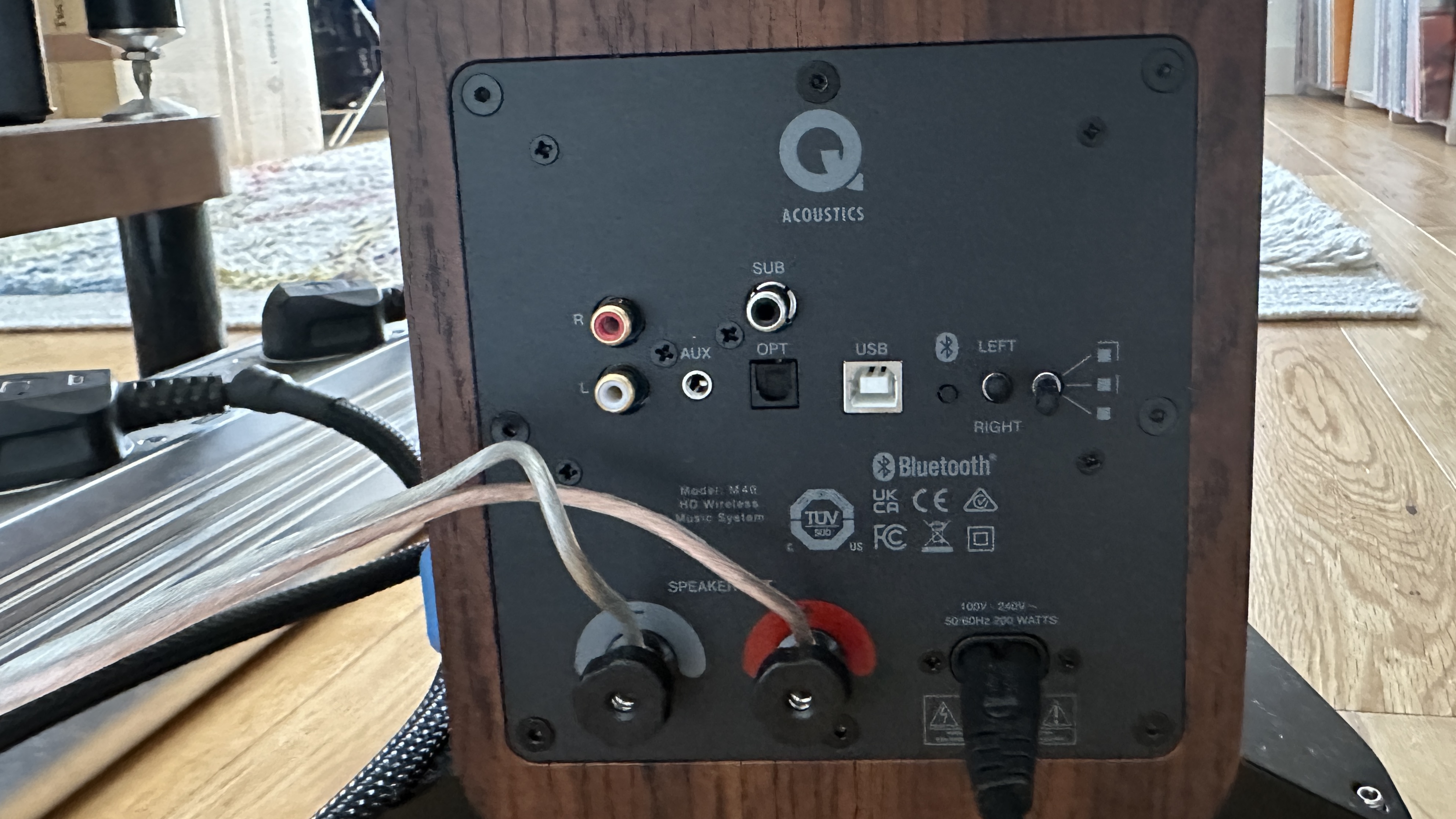
Q Acoustics M40 HD review: Features
- 2 x 100W of power
- Wired and wireless connectivity
- 24-bit/192kHz hi-res compatibility
Each M40 HD loudspeaker features a decoupled tweeter positioned above two Continuous Curved Cone (C³) mid/bass drivers of the type first encountered in the company’s more expensive (and lately award-winning) 5000 series. Each has a bass reflex port towards the bottom of the rear of the cabinet, to help with low-frequency presence and punch. After that, though, they become slightly different.
In the case of the ‘secondary speaker’, the only other feature is a pair of speaker-cable binding posts just beneath that reflex port. The ‘primary’ speaker, by way of contrast, has plenty more going on.
Sign up for breaking news, reviews, opinion, top tech deals, and more.
As well as speaker binding posts, the ‘primary’ speaker has an output for mains power on its rear plate. It also has a pair of stereo RCA analogue inputs, a 3.5mm auxiliary sockets, and inputs for digital optical and USB-B - these last two are able to digital with incoming digital audio files of up to 24bit/192kHz resolution. There’s a switch to let the speaker know if it’s occupying the left or right position in the set-up, and whether it’s in free space, against a wall or in a corner. And there’s a pre-out for a subwoofer for the truly antisocial among us.
Wireless connectivity, meanwhile, is strictly via Bluetooth. It’s the 5.0 variation, with SBC, AAC, aptX HD and Low Latency codec compatibility. Some wi-fi connectivity would be nice, sure, but it seems safe to assume that Q Acoustics has balanced the feature-set against the eventual price and come up with a balance it’s pleased with.
The ‘primary’ speaker also takes care of amplifying both speakers (these are 'powered', rather than truly 'active' beasts). It features two Class D blocks of amplification, each of 100 watts. The M40 HD is supplied with a length of cable to connect the two speakers together – this, along with a connection to mains power, is the only wiring this wireless system requires.
Features score: 4.5/5
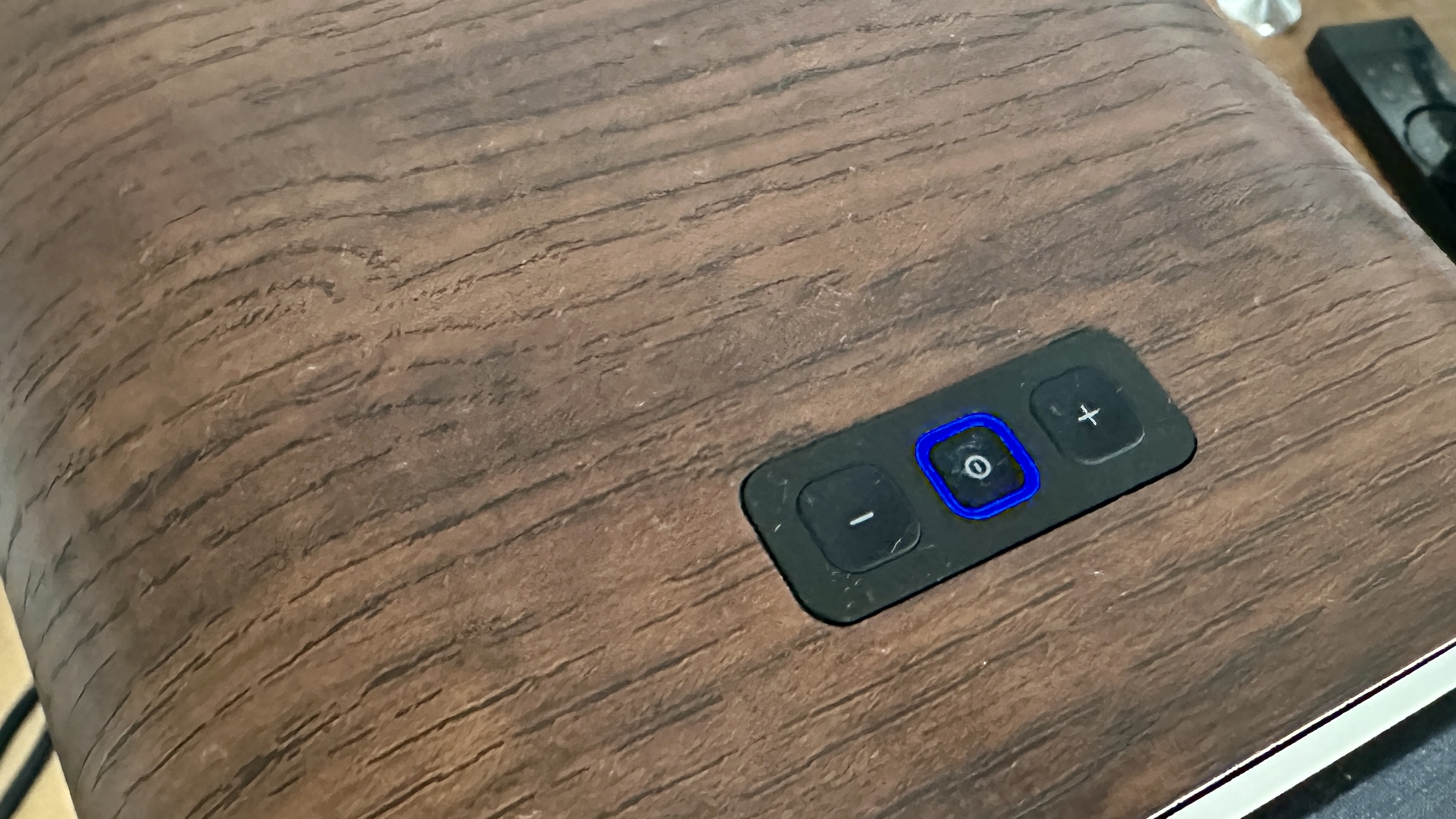
Q Acoustics M40 HD review: Sound quality
- Energy and dynamism to spare
- Strikes a nice balance between ‘insight’ and ‘entertainment’
- A moment’s care with positioning is required
It becomes apparent after next-to-no listening that the Q Acoustics M40 HD prefer to be out in just a little open space, not hard against a rear wall, and toed in just a little towards your listening position. They don’t throw in the towel if some or all of this is not possible in your space, you understand – but like all of us, they have their preferences.
And when they’re positioned just so, and are connected via Bluetooth to a Samsung Galaxy S23 smartphone using the aptX HD codec, and are playing a TIDAL-derived file of Grace Jones’ Pull Up to the Bumper, they’re an uncomplicatedly enjoyable listen. There are plenty of specific areas of music-making that are deserving of mention, but what’s most immediately evident is how engaging and upfront a listen the M40 HD is. This system sounds very much like it enjoys your favourite music almost as much as you do.
At every point in the frequency range, detail levels are impressively high and integration is smooth. The low frequencies are deep, nicely textured and enjoy proper control at the attack of notes or hits – and this straight-edged lead-in means the rhythm of the Grace Jones tunes is expressed confidently and positively. All the momentum the recording needs is available. And at the opposite end of the frequency range, there’s an enjoyable amount of bite and attack – but although treble sounds have plenty of shine, they’re also substantial. Which means the top end never gets out of hand, even if you decide to deploy every one of those 200 watts of Class D power that are available.
In between, there’s a stack of space in which La Jones can operate, a pocket in which the vocal is delivered with all of its attitude and character intact. Despite the spacious nature of the M40 HD presentation, though, each element of the recording is tightly integrated - so there’s never a suggestion of remoteness or isolation. The Q Acoustics system gives a good impression of ‘performance’, providing a great sensation of commonality and unity even if it’s playing very complex, element-heavy recordings.
Switching to a 24bit/192kHz Qobuz file of Curtis Mayfield’s (Don’t Worry) If There’s a Hell Below, We’re All Going to Go served to the M40 HD via its USB-B socket allows the system to demonstrate its prowess where soundstaging and dynamics are concerned. The presentation is wide and deep, with more than enough room for each strand of the recording to do its thing without being impacted on from elsewhere - and when Curtis and his band turn the wick up, the Q Acoustics tracks changes in intensity (as well as simple volume) faithfully. It’s an expressive, open listen overall, with a stack of pertinent observations to make - but most of all, it’s an energetic and entertaining listen.
In ultimate terms its tonality is on the warm-ish side of neutral, but that’s a trait rather than an outright flaw. And it’s safe to say the system doesn’t need all that much encouragement to overstate the lowest frequencies a little - so not only should you be reasonably careful about positioning, you might want to think about deploying the port bungs that are supplied. Other than this, though, it’s hard to find fault with the M40 HD’s presentation.
Sound quality score: 5/5
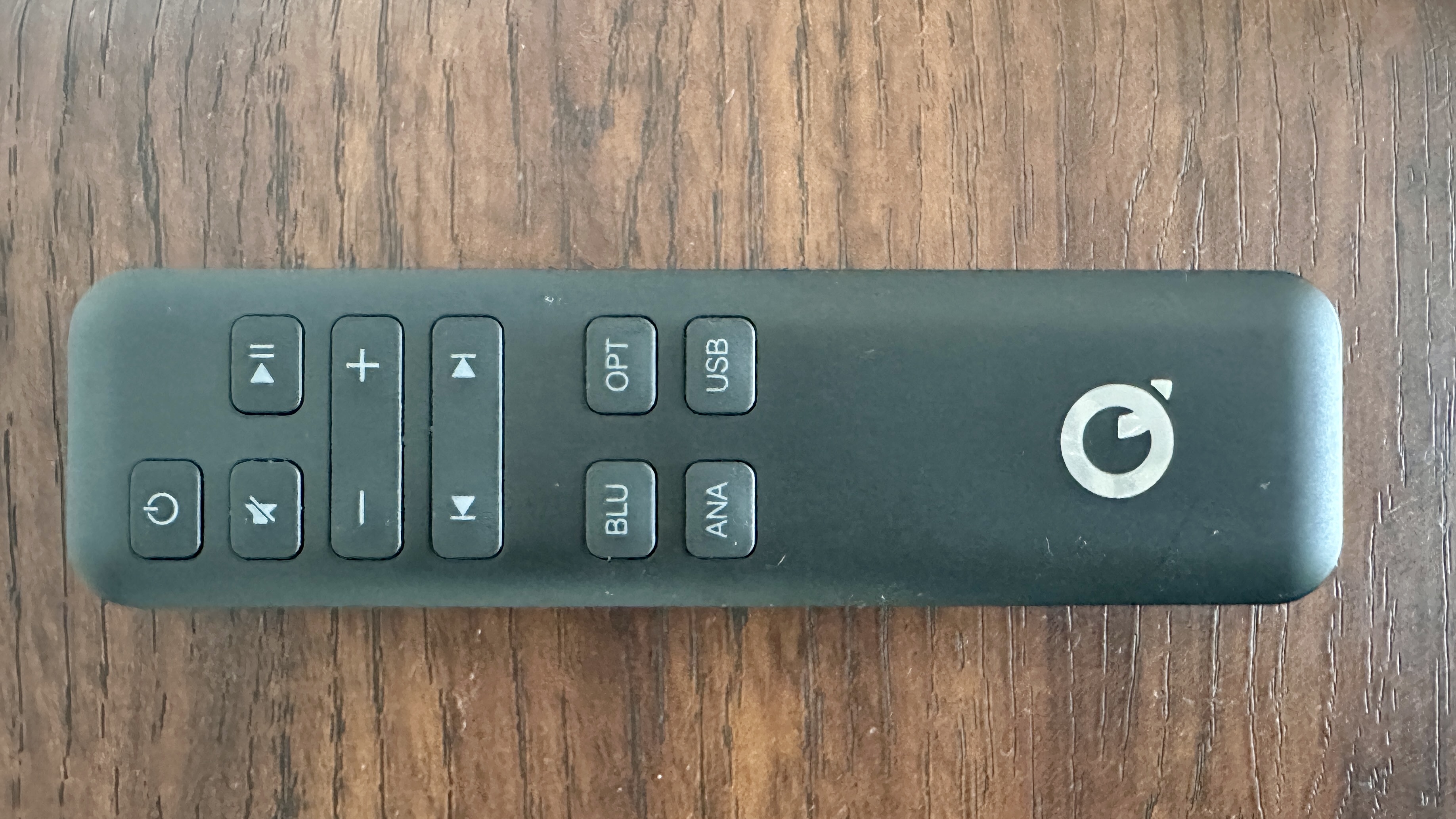
Q Acoustics M40 HD review: Design
- 710 x 250 x 296mm (HxWxD)
- Point-to-point cabinet bracing
- Choice of three finishes
It may not be immediately apparent from the pictures, but each M40 HD speaker is 710 x 250 x 296mm (HxWxD) including the little stabilisers at the back of the cabinet – and, as such, is to my knowledge unique in the current marketplace. Floorstanding speakers, whether passive or powered, are without exception quite a bit taller than this and so Q Acoustics has a unique offering here. Whether that’s ‘unique in a good way’ or not entirely depends on you – personally, I can easily imagine that a speaker of these dimensions will find favour with any number of customers who fancy some full-on audio performance without full-on speakers delivering it.
Other than the rather startling dimensions, it’s Q Acoustics design business as usual here – which is, broadly speaking, a good thing. The cabinet is vinyl-wrapped MDF (available in white or black in addition to the walnut of my review sample), and features the established and extremely successful point-to-point bracing technology that Q Acoustics has been perfecting for a while now. Each cabinet also has a Helmholtz Pressure Equaliser to reduce internal pressure and further reduce unwanted internal vibrations.
As with the M20 HD, each grille is fixed and cannot be removed. That’s a bit of a pity in aesthetic terms, if for no other reason that the C³ driver is quite a good-looking piece of technology (as long as you bear in mind that everything’s relative). Q Acoustics, though, makes a strong argument that fixing the grille in place allows its structure, particularly around the drivers, to be minimised – which reduces sonic reflections. And given that I can’t take the grilles off and find out for myself, I’m not really in any position to argue.
Design score: 5/5
Q Acoustics M40 HD review: Usability and setup
- Remote control handset
- A few simple controls
- Simple and quick to set up
On the top of the ‘primary’ speaker there are three little buttons. There’s a ‘volume up’ and a ‘volume down’ button, and the third takes care of ‘power on/off’, input selection and Bluetooth pairing.
These functions are duplicated on the remote control handset that’s supplied with the M40 HD. In addition, you get a ‘mute’ button and the ability to skip forwards or backwards through your streamed content. Apart from the fact that the volume adjustment is a slightly blunt instrument, it’s a perfectly serviceable little device.
Setting up the M40 HD couldn’t really be much simpler. There are stabilisers and spikes to be attached to the bottom of each speaker, and they must be connected using the supplied length of speaker cable. After that, plug the ‘primary’ speaker into the mains, and once you’ve told it what’s what as regards its position in your room, you’re good to go.
Usability and setup score: 5/5
Q Acoustics M40 HD review: Value
Whether or not these speakers are the right sort of size for your environment, there’s no denying the quality of their construction and finish. Add in specification that’s well up to snuff and sound quality that justifies the outlay every time, and the Q Acoustics M40 HD represents unarguable value for money.
Value score: 5/5
Q Acoustics M40 HD review: Should you buy it?
Buy it if...
You value convenience
This is a just-add-smartphone complete system that’s simplicity itself to set up and operate.
You want sound that’s bigger than the speakers it’s coming from
There are many admirable aspects of the sound quality available here, but most immediately impressive is just how much of it there is.
Space is at a premium
Smaller room? Suddenly that’s no impediment to getting a bigger sound - and without breaking the bank, either.
Don't buy it if...
You suffer from microphobia
Easily freaked out by things that are smaller than it feels like they ought to be? The M40 HD could cause you consternation.
You’re expecting a control app
Between the remote control and the on-system physical buttons, it’s simple to use the M40 HD – but it’s undeniably slightly low-tech…
Q Acoustics M40 HD review: Also consider
Where their configuration is concerned, the Q Acoustics M40 HD are currently number one in a field of one – almost every price- and function-comparable alternative is a pair of standmounting speakers. So while the more expensive KEF LSX II LT is better-specified in some ways, it doesn’t have a hope of delivering the sheer scale of sound the M40 HD can muster – and neither can the similarly talented (but similarly bijou) KEF LS50 Wireless II. But if everything except the price is appealing about the M40 HD, then check out their smaller, more affordable but similarly high-achieving Q Acoustics M20 HD siblings.
Q Acoustics M40 HD review: How I tested
- Standing in free(ish) space
- Using every available input
- Lots of music over a fair amount of time
The only connection I didn’t use was the subwoofer pre-out – because, quite frankly, the M40 HD sounds hefty enough by itself (especially if you position it too close to a rear surface, where the reflex ports can get a bit pushy). But the analogue inputs accommodate a pre-amplified turntable, the digital optical was used for a CD player, the USB-B connected the system to a laptop… and, of course, Bluetooth was handy for use with a smartphone. And then it was really just a case of listening to lots of familiar music, at a variety of volume levels, for as long as I thought I could get away with it…
- First reviewed February 2024
- Read more about how we test

Simon Lucas is a senior editorial professional with deep experience of print/digital publishing and the consumer electronics landscape. Based in Brighton, Simon worked at TechRadar's sister site What HiFi? for a number of years, as both a features editor and a digital editor, before embarking on a career in freelance consultancy, content creation, and journalism for some of the biggest brands and publications in the world.
With enormous expertise in all things home entertainment, Simon reviews everything from turntables to soundbars for TechRadar, and also likes to dip his toes into longform features and buying guides. His bylines include GQ, The Guardian, Hi-Fi+, Metro, The Observer, Pocket Lint, Shortlist, Stuff T3, Tom's Guide, Trusted Reviews, and more.
